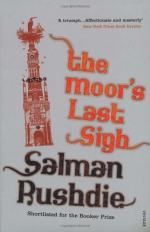|
This section contains 1,181 words (approx. 4 pages at 300 words per page) |

|
SOURCE: "City of Mongrel Joy," in New Statesman & Society, Vol. 8, No. 369, September, 1995, pp. 39-40.
In the following review, Hussein relates the plot of The Moor's Last Sigh.
Moraes Zogoiby, nicknamed Moor—the half-Jewish, half-Christian narrator of The Moor's Last Sigh—is on his way to self-exile in Spain. At the conclusion of a harrowing portrayal of the events that lead up to his city's moral and physical devastation, he muses: "There was nothing holding me to Bombay anymore. It was no longer my Bombay, no longer special, no longer the city of mixed-up, mongrel joy."
For the city of Bombay—in reality, as in Salman Rushdie's stunningly accurate dark recreation in his latest and possibly finest novel—has fallen prey to violence, corruption and the likes of the novel's villainous Raman Fielding (nicknamed Mainduck, or frog).
Fielding is the leader of a party of chauvinists and thugs who...
|
This section contains 1,181 words (approx. 4 pages at 300 words per page) |

|


